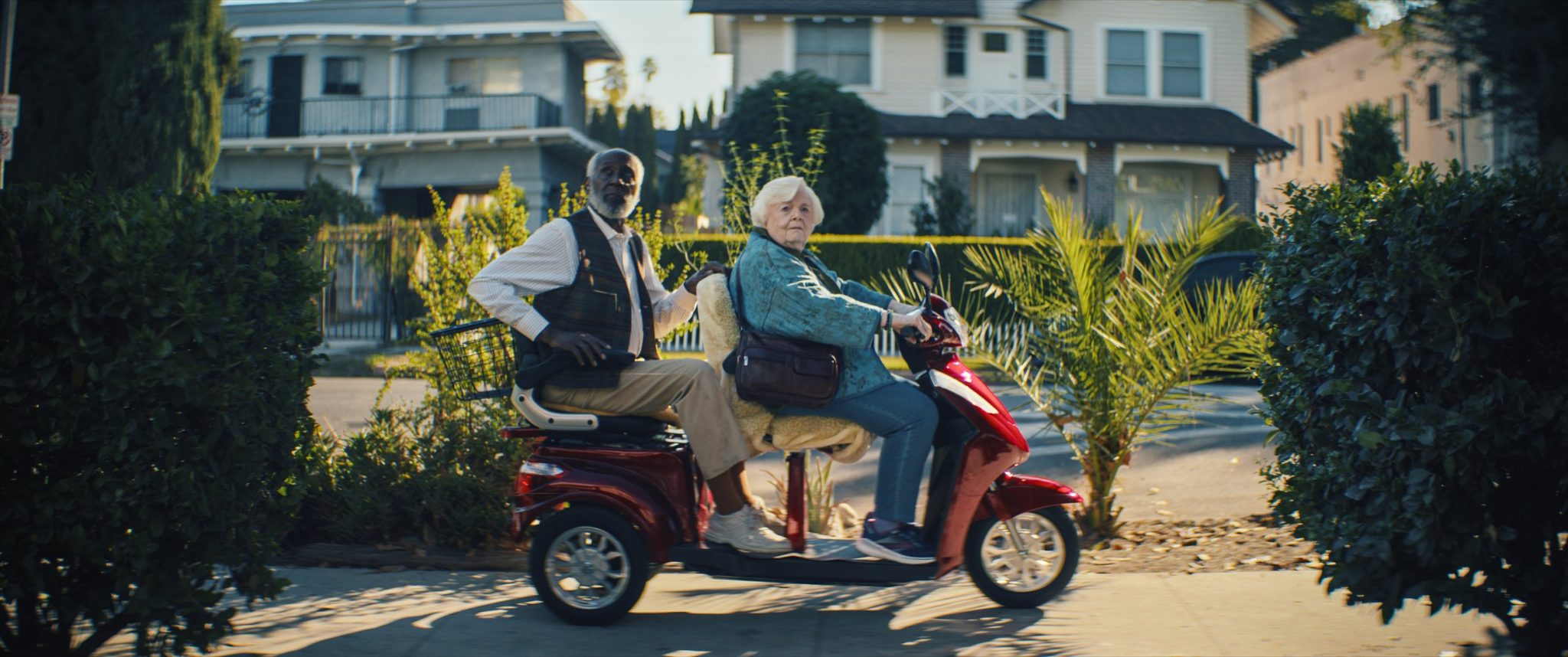We are only in June, but I can say with some confidence that “Thelma” will be the best comedy of 2024. And not just because when I screened it this week, by myself, on a computer, under the waning influence of a rotten cold and in no mood to enjoy myself, I still laughed out loud, early and often: The movie uplifted me in the ways only good cinema can. But it’s the best comedy because it’s brutally honest, and it recognizes that tragedy is the yin to its yang, lurking just outside the frame and occasionally creeping into it.
June Squibb, in yet another humane performance of effortless richness and vulnerability, plays Thelma Post, a widowed 93-year-old (Squibb herself is a spry 94) who lives a comfortable senior life of computer games and pill box organizers, crocheting and the evening news. Her contentment is thrown into disarray when she falls victim to a typical elder scam. A panicked voice on the phone pretends to be her grandson, calling from a prison cell; he needs $10,000 in cash to be bailed out. She sends the money to a P.O. Box, only to be informed by her perfectly healthy grandson Danny (Fred Hechinger), Thelma’s daughter Gail (Parker Posey) and the local police that she’s been duped. When told that such scams proliferate on social-media sites like Facebook, Thelma is aghast, countering, “Shouldn’t Zuckemborg be able to fix this!?”
In one of the earliest scenes in “Thelma,” the title character and Danny watch a “Mission: Impossible” movie on her boxy television, and the globetrotting, world-saving gallivants of Ethan Hunt serve as a hilarious leitmotif. “Thelma” is a casual caper, a low-stakes mission that is, on paper, quite possible. Digging through the trash of a USPS bathroom, the resourceful grandmother finds the address where she sent the cash and, despite her defeatist family—who insist that’s all over with, let’s move on—embarks on a stealth journey to retrieve it.

This conceit inspires the cleverest gags in “Thelma,” from a low-speed chase scene, on electric scooters, in the anodyne halls of an assisted-living facility, to the theft of a gun in the upstairs bedroom of an old friend—a device that fires in the process, but because everyone in the scene is so hard of hearing, nobody even flinches. It’s a moment right out of peak Mel Brooks.
Like most smart comedies, “Thelma” has more on its mind than the surface high jinks, as successful as they are. There are limits to its caprice. Indeed, it’s a film that reckons with aging in all its inelegance. In Thelma’s rogue travels through care facilities and the cockroach-infested homes of her contemporaries, she encounters bodies and souls in varying degrees of coherence, and hears tales of infirmity, accident and woe from her diminished Rolodex of contacts—the ones that are still alive, that is. Those that do keep plugging on have inevitably lost a step. We are constantly reminded that, in the words of Thelma’s partner-in-revenge, Ben (Richard Roundtree), “we’re not what we were.”
“Thelma” appreciates the hopeless feeling of falling when there’s no one around to pick you up. When it happens to Thelma, and she removes her hearing aids out of resignation, the sound they make is similar to a flatlining heart monitor. Even when the comedy seems lighter than air, we never forget the gravity.
In this context, collecting the 10 grand that is rightfully hers is about more than the money; it’s an extreme assertion of her independence in an increasingly dependent world. If you’ve been around defiant seniors, there’s no scene more familiar than the two or three times Thelma removes her medic-alert bracelet as soon as her family members are out of the picture. I also recognized, from my own late paternal grandmother, Thelma’s belief that everyone on the street looks familiar (and given that she’s lived nine decades and seen a lot of faces, she’s correct an unusual amount of the time).
For a film this accurately written, staged and directed, it’s astonishing that “Thelma” is the work of a neophyte filmmaker, in first-timer Josh Margolin. In one subtle touch, he often blurs the edges of his frame and distorts the image with a fish-eye lens, effectively placing us in the vision-impaired eyes of his protagonist.
But what I may remember most from “Thelma” is the depth of its humanism. In this movie, even the villains, when we finally meet them, earn our pity. The ringleader isn’t some evil “M:I” psychopath built on world domination; he’s a struggling shop owner limping around with an oxygen tank. There are no cheap laughs in this brilliant comedy—only uncomfortable truths.
“Thelma” opens today at Cinemark Palace and IPIC in Boca Raton, Movies of Delray and IPIC in Delray Beach, and other area theaters.
For more of Boca magazine’s arts and entertainment coverage, click here.







